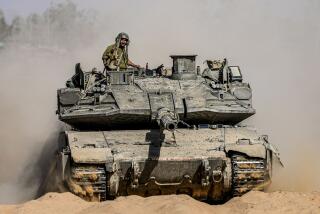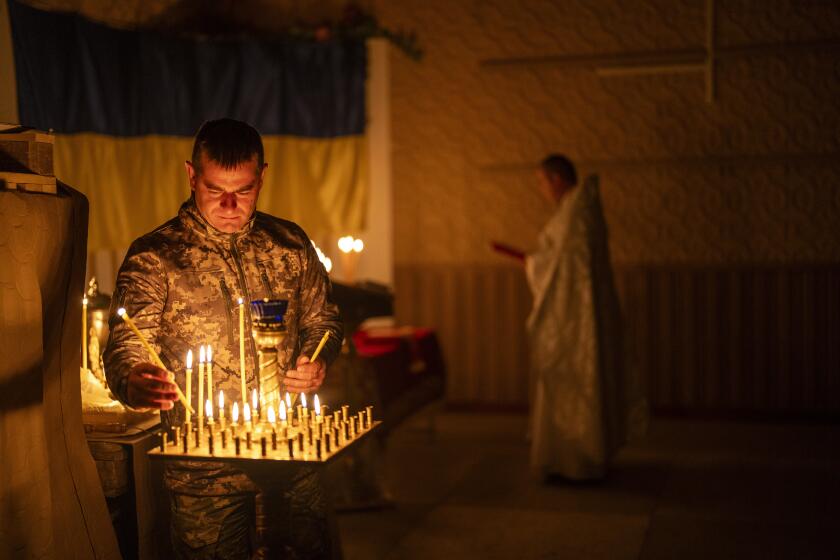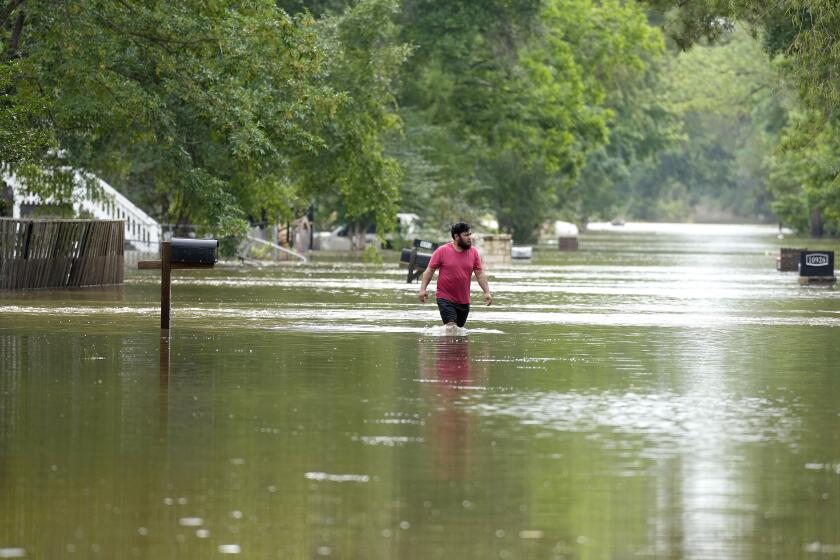Face to Face With Evil
The burst of assault weapon fire that tore into the flesh of innocent children this week in Los Angeles and jolted a nation still reeling from indiscriminate shootings in Littleton, Colo., and Atlanta raised troubling questions about the existence of evil.
If the world was created by a God of love and holiness, as the great faiths teach, how does religion explain and respond to the existence of evil? Why does God allow it? Why do bad things happen to good people?
Theologians have long grappled with how evil is tolerated, and ultimately vindicated, by a just god. But for frightened children and anguished parents, the events that unfolded this week were anything but abstract.
Evil--tactile, menacing and real--again seared the nation’s consciousness and religious sensibilities, this time out of the barrel of an assault rifle allegedly wielded by a self-proclaimed white racist and hatemonger on a quiet residential street in Granada Hills. The suspect, Buford Oneal Furrow, told police he shot up the North Valley Jewish Community Center as a “wake-up call” to others to kill Jews. Five people, including three young children, were wounded. Police said Furrow is also believed to have later killed a mail carrier after evading a police dragnet around the community center.
For thousands of years, humans have grappled with the problem of evil. Now, in yet another outburst of senseless violence, people of faith are once again turning to religion for consolation and answers.
“Synagogue attendance will be very high this weekend. Jews will seek the comfort of being in the presence of their fellow Jews and of gaining some wisdom and some perception of what this means and how our tradition teaches us how we need to respond,” said Rabbi Bradley Shavit Artson, dean of the Ziegler School of Rabbinic Studies at the University of Judaism in Los Angeles.
Judaism, Christianity and Islam all teach that the same God created the world and in creating humans allowed them to choose between good and evil. God, they teach, is not a god who compels obedience or good behavior.
“God could make us love one another and make us love God, force us that way, but I think God is a god of relationship,” said the Rev. Gregory H. Frost, rector of St. Andrew and St. Charles Episcopal Church, where two dozen children from the Jewish day camp were brought for sanctuary minutes after the shooting. “As much as I am married to my wife,” Frost said, “I don’t want her to be forced to love me. I don’t think God wants that either. I think God created humanity with relationship with God and between one another. Free will means you’re going to get crackpots that are going to misuse it.”
Free will also means that we must sometimes face the consequences of choices made by others like Furrow. For Jews, Artson said, the problem of evil is not so much a theological issue as an ethical challenge.
“What evil does is pose the ethical challenge to do something about it. The psalms say that those who love the Lord hate evil. If you want to love God, you have to be able to rise up against the pharaohs of your time and the oppressors of your time and make common cause with everyone else in opposing evil.”
Unity has been a common theme this week as religious leaders and people of differing faiths have spoken out against the brutal assault at the Jewish community center and the slaying of postal worker Joseph Ileto, 39.
“When someone deliberately attacks people of faith and faith commitment, it is not just those who were struck that have been wounded; we have all felt the sharp pain of violence, we have all been attacked,” said Cardinal Roger M. Mahony, the Roman Catholic archbishop of Los Angeles.
The Rt. Rev. Frederick H. Borsch, Episcopal bishop of Los Angeles, said the senseless attack on children and their caregivers “goes against every principle of faith and moral character to which God calls us all. . . . We utterly condemn this hate crime and all such violence that so reprehensibly singles out individuals and groups on the basis of creed and cultural background.”
Maher Hathout, spokesman for the Islamic Center of Southern California, added, “This shooting of innocent people, including children, is a direct attack upon our entire city and all of its citizens.”
Solidarity in the face of evil, religious leaders of all three faiths said, is indispensable.
Still, the question of why evil happens and sometimes changes the lives of others remains.
“We live in a sense in an imperfect world with imperfect people,” Rabbi Harvey J. Fields of Wilshire Boulevard Temple said. “What I learn from this is not to blame God for the creation of another human being, but rather to realize that human beings are partners of God in somehow ridding the world of this kind of evil. We have to begin with ourselves in what we do and teach, and do a better job.”
Rabbi Harold M. Schulweis of Valley Beth Shalom in Encino said Judaism has two categories of evil. One is natural evil, such as the tornado that struck Salt Lake City this week. The other is human evil.
“There is hatred. This clearly must have been the case here,” Schulweis said. “What goes into a mind that is so twisted that it takes its anger or frustration out on innocent children? But that is not a judgment of God.”
Schulweis said he read one news story of the shooting in which a little girl was quoted as having asked her mother if she did something wrong. Why else, the little girl’s question suggested, would a man try to shoot her?
“It’s most important to eliminate the question of guilt in the minds of those who are recipients of this tragedy,” Schulweis said. “Neither the wounding or an attempt to kill is a judgment of God in which God is either rewarding or punishing. This is the way nature is. But what do we do about it? The community should come together and say, ‘We are now neighbors!’ ”
Frost, the Episcopal priest, said he had heard a police officer say that God must have been with the children who managed to reach sanctuary in his church, physically unharmed. “But the God I believe in was lying in that [Jewish community center] room bleeding with those [wounded] kids. The God I believe in cries when those things happen.”
More to Read
Start your day right
Sign up for Essential California for news, features and recommendations from the L.A. Times and beyond in your inbox six days a week.
You may occasionally receive promotional content from the Los Angeles Times.






